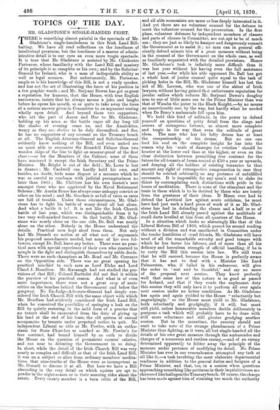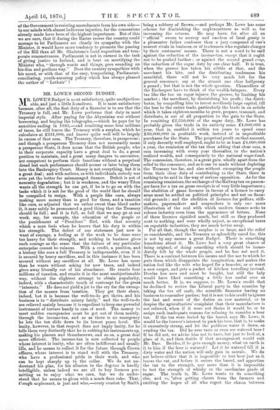TOPICS OF THE DAY.
MR. GLADSTONE'S SINGLE-HANDED FIGHT.
THERE is something almost painful in the spectacle of Mr. Gladstone's single-handedness in this Irish Land Bill- baiting. We have all read reflections on the loneliness of intellectual greatness, but the loneliness of a master of admin- istrative detail is to our eyes an even more tragic spectacle. It is true that Mr. Gladstone is assisted by Mr. Chichester Fortescue, whose familiarity with the Land Bill and mastery of its principle is as complete as his own ; and by the Solicitor- General for Ireland, who is a man of indisputable ability as well as legal acumen. But unfortunately, Mr. Fortescue, ample as is his knowledge of this Bill, is not a ready speaker, and has not the art of illustrating the force of his position in a few graphic words ; and Mr. Serjeant Dowse has got so great a reputation for humour, that the House, with true English narrowness, insists that he always means a joke, and laughs before he opens his mouth, so as quite to take away the force of a serious answer given in Committee to an argument resting wholly upon detail. And beyond these two supporters, who act the part of Aaron and Hur to Mr. Gladstone, holding up his arms as the battle rages all day long till the shades of evening come on, and the Amalekites, weary as they are, decline to be duly discomfited, and flee, he has no supporters of any account on the Treasury bench at all. The English Attorney-General and Solicitor-General evidently know nothing of the Bill, and even united are no more able to encounter Sir Roundell Palmer than two wooden ships of the line to fight an armour-proof of the first class ;—as for the Members of the Cabinet, none of them have mastered it except the Irish Secretary and the Prime Minister. Mr. Bright is out of the field ; Mr. Lowe is lost in finance ; Mr. Cardwell can hardly hold his own, and besides, no doubt, feels some disgust at a measure which he was so careful to condemn with judicial peremptoriness no later than 1865 ; Mr. Childers has his own hornet's nest amongst those who are aggrieved by the Naval Retirement Scheme ; Mr. Austin Bruce has always some unhappy convict or other on his mind ; and Mr. Goschen is as full of rates as rates are full of trouble. Under these circumstances, Mr. Glad- stone has to fight his battle of weary detail all but alone. And what a battle it is ! It is not like the Irish Church battle of last year, which was distinguishable from it by two very well-marked features. In that battle, if Mr. Glad- stone was nearly alone on the one side, Dr. Ball was nearly alone on the other. Nobody in the House understood the details. Practical men kept aloof from them. Not only had Mr. Disraeli no notion at all what sort of arguments his proposed amendments needed, but none of his own fol- lowers, except Dr. Ball, knew any better. There were no prac- tical men with special experience of their own who yearned to mingle in the fight and distinguish themselves by noble deeds. There were no such champions as Mr. Read and Mr. Corrance on the Opposition side. There was no great opening for practical mischief to such men as Lord Elcho and Lord Claud J. Hamilton. Mr. Kavanagh had not studied the pro- visions of that Bill ; Colonel Barttelot did not find it within the purview of his practical reason. And what is of even more importance, there were not a great crop of acute critics on the benches behind the Government . and below the gangway. No Ex-Judge-Advocate-General had deeply con- sidered the Irish Church Bill with the same object with which Mr. Headlam had evidently considered the Irish Land Bill, when he conceived the possibility of springing a leak on the Bill by quietly restoring, in the mild form of a proviso that no tenant shall be exonerated from the duty of giving up his land at the end of his lease, the old system of annual occupancies by tenants under perpetual notice to quit. No independent Liberal so able as Mr. Fowler, with an enthu- siasm for State Churches as marked as Mr. Fowler's for free contract, had bound himself by an oath to divide the House on the question of permanent curates' salaries, and ran near to defeating the Government in so doing. In short, while the detail of the Irish Church Bill was very nearly as complex and difficult as that of the Irish Land Bill, it was on a subject so alien from ordinary members' medita- tions, that nine-tenths of the House were as incompetent as Mr. Disraeli to discuss it at all. But here we have a Bill abounding in the very detail on which squires are apt to ponder in the night-season or in their morning rides about the estate. Every county member is a born critic of the Bill, and all able economists are more or less deeply interested in it. And yet there are no volunteer counsel for the defence to meet the volunteer counsel for the prosecution. In the first place, volunteer defences by independent members of clauses.
and parts of clauses in Committee, are not. apt to be of much use ; they are just as likely to hamper and dangerously commit the Government as to assist it ; no man can in general effi- ciently defend minute bits of a great measure without being in the counsel of the Government on the whole case, as well as familiarly acquainted with the detailed provisions. Hence Mr. Gladstone's task is infinitely more difficult than it was last year without his having even the full assistance of last year,—for while his able opponent Dr. Ball has got a whole host of junior counsel quite equal to the task of picking holes in the Bill, Mr. Gladstone himself has lost the aid of Mr. Lawson, who was one of the ablest of Irish lawyers, without having gained that unfortunate reputation for jocular sallies which reduces Mr. Serjeant Dowse's doughty arm to one of little more use to the Prime Minister than was that of Wamba the jester to the Black Knight,—by no means an unserviceable one, by the way, but hardly what he needed when De Bracy's ambuscade fell upon him.
We hold this kind of solitude, in the power to defend yourself on questions of petty detail from the slings and arrows of outrageous fortune, as almost more complete and tragic in its way than even the solitude of great ideas. The man who has his lofty dream has at least the companionship of his dream. But no one can feed his soul on the complete insight he has into the reason why his scale of damages for eviction ' should be heavier at the lower end than at the higher, or even on the clear distinction between permitting free contract for the future for all tenants of farms rented at £50 a year or upwards, and denying all the holders of existing tenancies to that• amount any right of retrospective compensation in case they should be evicted arbitrarily on any pretence of unfulfilled_ covenants. It is impossible for any man's soul to slake its thirst by contemplating such distinctions with pride in the hours of meditation. There is none of the stimulant and the tonic in them which is to be derived by those who are lonely from the greatness of their ideas. If Moses ever had to defend the Levitical law against acute criticism, he mast have had just such a hard piece of work of it as Mr. Glad- stone has had in defending the clause and a half or so of the Irish Land Bill already passed against the multitude of small darts levelled at him from all quarters of the House.
In a situation which looks so alarmingly like that of the Liberal Reform Bill of 1860, which passed its second reading without a division and was smothered in Committee under the tender hostilities of cruel friends, Mr. Gladstone will have need of all the remarkable serenity and good temper with which he has borne his labours, and of more than all his delicacy and herculean strength of official handling, if he is to carry the Bill this session into law. We still trust that he will succeed, because the House is perfectly aware that it has not to deal with a Minister like Lord Palmerston, who, if foiled in his endeavour, will give the order to 'rest and be thankful,' and say no more of the proposal next session. They know perfectly well that some law of this nature is as good as passed for Ireland, and that if they evade the unpleasant duty this session they will only have it to perform all over again next session under no better conditions. As Mr. Gladstone has again and again yielded to the House " reluctantly but ungrudgingly," so the House must yield to Mr. Gladstone, both reluctantly and grudgingly, if it will, but must still yield, unless honourable members decide deliberately to postpone a task which will probably have to be done with still more reluctance and still greater grudging another session. But in the meantime, the country should not omit to take note of the strange phenOmenon of a Prime Minister thus fighting, as it were, all but single-handed all the details of his own great measure through the ambuscades and charges of a numerous and restless enemy,—and of an enemy determined apparently to fritter away the principle of the measure under pretence of modifying its detail. No Prime Minister has ever in our remembrance attempted any task at all like it,—a task involving the most elaborate departmental readiness in addition to the general duties and fatigues of a Prime Minister, and that, too, in a session when questions approaching something like pettiness in their inquisitiveness are showered like hail upon the Treasury bench. Of course, the charge has been made against him of straining too much the authority
of the Government in resisting amendments from his own side— to our minds with almost ludicrous injustice, for the concessions already made have been of the highest importance. But of this we are sure, that if during the Easter recess the country could manage to let Parliament see clearly its sympathy with the Minister, it would have more tendency to promote the passing of the Bill than all Mr. Gladstone's lucid exposition and tem- perate remonstrances. Parliament is not in earnest in the task of giving justice to Ireland, and is bent on mortifying the Minister who, " through words and things, goes sounding on his dim and perilous way." Does the country sympathize with his mood, or with that of the easy, temporizing, Parliament- conciliating, youth-amusing policy which has always pleased the author of "Lothair" ?































 Previous page
Previous page